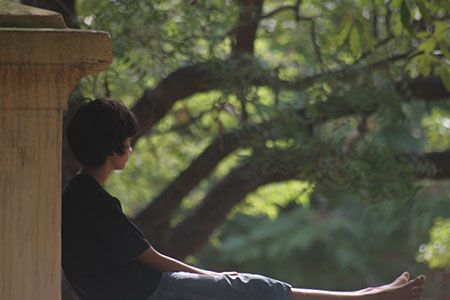Intent of the school



Jiddu Krishnamurti
Krishnamurti (1895-1986) whose life and teachings spanned the greater part of the 20th Century, is regarded by many as one who has had the most profound impact on human consciousness in modern times.
Sage, philosopher and thinker, he illumined the lives of millions the world over – intellectuals and laymen, young and old. Breaking away from all organized religions and denying his role as a Guru, he spelt out his mission: to set man absolutely and unconditionally free.
He travelled round the world till the age of 90 giving talks, writing, holding discussions.
He talked of the things that concern all of us in our everyday life; the problems of living in modern society, the individual’s search for security, and the need for human beings to free themselves from from their inner burdens of violence, fear and sorrow.
The Intent of the Krishnamurti Schools
It is becoming more and more important in a world that is destructive and degenerative that there should be a place, an oasis, where one can learn a way of living that is whole, sane, and intelligent. Education in the modern world has been concerned with the cultivation not of intelligence, but intellect, of memory and its skills. In this process little occurs beyond passing information from the teacher to the taught, the leader to the follower, bringing about a superficial and mechanical way of life. In this there is little human relationship.
Surely a school is a place where one learns about the totality, the wholeness of life. Academic excellence is absolutely necessary, but a school includes much more than that. It is a place where both the teacher and the taught explore not only the outer world, the world of knowledge, but also their own thinking, their own behaviour. From this they begin to discover their own conditioning and how it distorts their thinking. This conditioning is the self to which such tremendous and cruel importance is given. Freedom from conditioning and its misery begins with this awareness. It is only in such freedom that true learning can take place. In this school it is the responsibility of the teacher to sustain with the student a careful exploration into the implications of conditioning and thus end it.
A school is a place where one learns the importance of knowledge and its limitations. It is a place where one learns to observe the world, not from any particular point of view or conclusion. One learns to look at the whole of man’s endeavour, his search for beauty, his search for truth and for a way of living without conflict. Conflict is the very essence of violence. So far education has not been concerned with this, but in this school our intent is to understand actuality and its action without any preconceived ideals, theories, or beliefs which bring about a contradictory attitude towards existence.
The school is concerned with freedom and order. Freedom is not the expression of one’s own desire, choice or self-interest. That inevitably leads to disorder. Freedom of choice is not freedom, though it may appear so; nor is order conformity or imitation. Order can only come with the insight that to choose is itself the denial of freedom.
In school one learns the importance of relationship which is not based on attachment and possession. It is here one can learn about the movement of thought, love and death, for all this is our life.
From the ancient of times, man has sought something beyond the materialistic world, something immeasurable, something sacred. It is the intent of this school to inquire into this possibility.
The whole movement of inquiry into knowledge, into oneself, into the possibility of something beyond knowledge, brings about naturally a psychological revolution, and from this comes inevitably a totally different order in human relationship, which is society. The intelligent understanding of all this can bring about a profound change in the consciousness of mankind.
Ojai, 1984 – J Krishnamurti
First written in 1975, later revised with the Oak Grove School staff and initially published as "The Intent of Oak Grove School”. It was distributed at Krishnamurti's request at the 1984 Ojai Talks under the title "The Intent of the Krishnamurti Schools". © 1981 Krishnamurti Foundation Trust Ltd. Brockwood Park, Bramdean, Hampshire SO24 0LQ England.
The Aim of the Krishnamurti Schools
Questioner: You have often said no one can show you the way to truth. Yet your schools are said to help their members to understand themselves. Is this not a contradiction? Does it not create an élite atmosphere?
Krishnamurti: The speaker has said that there is no path to truth, that no one can lead another to it. He has repeated this very often for the last sixty years. And the speaker with the help of others has founded schools in India, here and in America. The questioner says: are you not contradicting yourself when the teachers and the students in all these schools are trying to understand their own conditioning, educating themselves not only academically, but also educating themselves to understand their own whole conditioning, their whole nature, their whole psyche? One doesn't quite see the contradiction.
Since the times of ancient Greece and ancient India, schools have been places where you learn. Learn where there is leisure. Please go with me a little bit. You cannot learn if you have no leisure - that is, time to yourself, time to listen to others, time to inquire. Such a place is a school. The modern schools all over the world are merely cultivating one part of the brain, which is engaged in the acquisition of knowledge, technology, science, biology, theology and the like. They are only concerned with the cultivation of a particular part of the brain which acquires a great deal of knowledge, outer knowledge. That knowledge can be used skilfully to earn a livelihood, or unskilfully, depending on the person. Such schools have existed for thousands of years.
Here in these schools we are trying something entirely different. We are trying not only to educate academically to "O" and "A" levels, but also to cultivate an understanding, an inquiry into the whole psychological structure of human beings. Students come already conditioned, so there begins the difficulty. One has not only to help generally to uncondition but also to inquire much more deeply. This is what these schools with which we are connected are trying to do. They may not succeed or they may. But as it is a difficult task, one must attempt it, not always follow the easiest path. This is a difficult subject to go into, but it doesn't create an élite. And what is wrong with an élite? Do you want everybody and everything pulled down to the common denominator? That is one of the troubles of so-called democracy.
So there is no contradiction as far as one can see. Contradiction exists only when you assert something at one time and contradict it at another. But here we are saying that no one can lead you to truth, to illumination, to the right kind of meditation, to right behaviour, no one, because each one of us is responsible for oneself, not depending on anybody at all. We are trying in all these schools to cultivate a mind, a brain that is holistic, acquiring knowledge for action in the world, but not neglecting the psychological nature of man, because that is far more important than the academic career. To have the capacity to earn a livelihood in the present world, the present civilisation, whatever that civilisation is, a certain kind of education is apparently necessary, and most schools in the West and in the East are neglecting the other side, which is far deeper and greater. But here we are trying to do both, which is something not done in other schools. We may succeed, we hope we do, but also we may not. There is no contradiction.
Brockwood Park, England, 1 September 1981